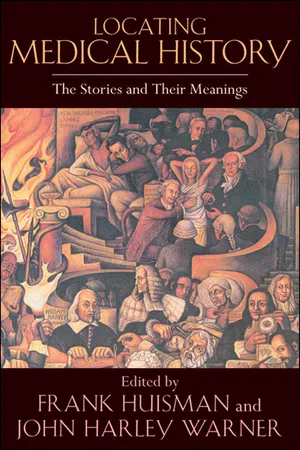
- English
- ePUB (mobile friendly)
- Available on iOS & Android
About this book
The issues constituting the history of medicine are consequential: how societies organize health care, how individuals or states relate to sickness, how we understand our own identity and agency as sufferers or healers. In Locating Medical History: The Stories and Their Meanings, Frank Huisman, John Harley Warner, and other eminent historians explore and reflect on a field that accommodates a remarkable diversity of practitioners and approaches.
At a time when medical history is facing profound choices about its future, these scholars explore the discipline in the distant and recent past in order to rethink its missions and methods today. They discuss such issues as the periodic estrangement of medical history from medicine, the influence of Foucault on the writing of medical history, and the shifts from social to cultural history and back again. Chapters explore the early history of the field, its transformations since the 1970s, and its prospects for the future.
With diverse constituencies, a multiplicity of approaches, styles, and aims is both expected and desired. This volume locates medical history within itself and within larger historiographic trends, to provide a springboard for discussions about what the history of medicine should be, and what aims it should serve.
Contributors: Olga Amsterdamska, University of Amsterdam; Warwick Anderson, University of Wisconsin, Madison; Allan M. Brandt, Harvard Medical School; Theodore M. Brown, University of Rochester; Roger Cooter, University College London; Martin Dinges, Institut für Geschichte der Medizin der Robert Bosch Stiftung; Alice Domurat Dreger, Michigan State University; Jacalyn Duffin, Queen's University; Elizabeth Fee, National Library of Medicine; Mary E. Fissell, The Johns Hopkins University; Danielle Gourevitch, École Pratique des Hautes Études; Anja Hiddinga, University of Amsterdam; Ludmilla Jordanova, University of East Anglia; Alfons Labisch, Heinrich-Heine-University; Hans-Uwe Lammel, University of Rostock; Sherwin B. Nuland, Yale University; Vivian Nutton, University College London; Roy Porter, formerly University College London; Susan M. Reverby. Wellesley College; David Rosner, Columbia University; Thomas Rütten, University of Newcastle upon Tyne; Heinz-Peter Schmiedebach, University of Greifswald; Christiane Sinding, Institut National de la Santé et de la Recherche Médicale
Frequently asked questions
- Essential is ideal for learners and professionals who enjoy exploring a wide range of subjects. Access the Essential Library with 800,000+ trusted titles and best-sellers across business, personal growth, and the humanities. Includes unlimited reading time and Standard Read Aloud voice.
- Complete: Perfect for advanced learners and researchers needing full, unrestricted access. Unlock 1.4M+ books across hundreds of subjects, including academic and specialized titles. The Complete Plan also includes advanced features like Premium Read Aloud and Research Assistant.
Please note we cannot support devices running on iOS 13 and Android 7 or earlier. Learn more about using the app.
Information
Table of contents
- Cover Page
- Title Page
- Dedication
- Contents
- Acknowledgments
- Chapter 1: Medical Histories
- Part I:Traditions
- Part II : A Generation Reviewed
- Part III: After the Cultural Turn
- Notes on Contributors
- Index